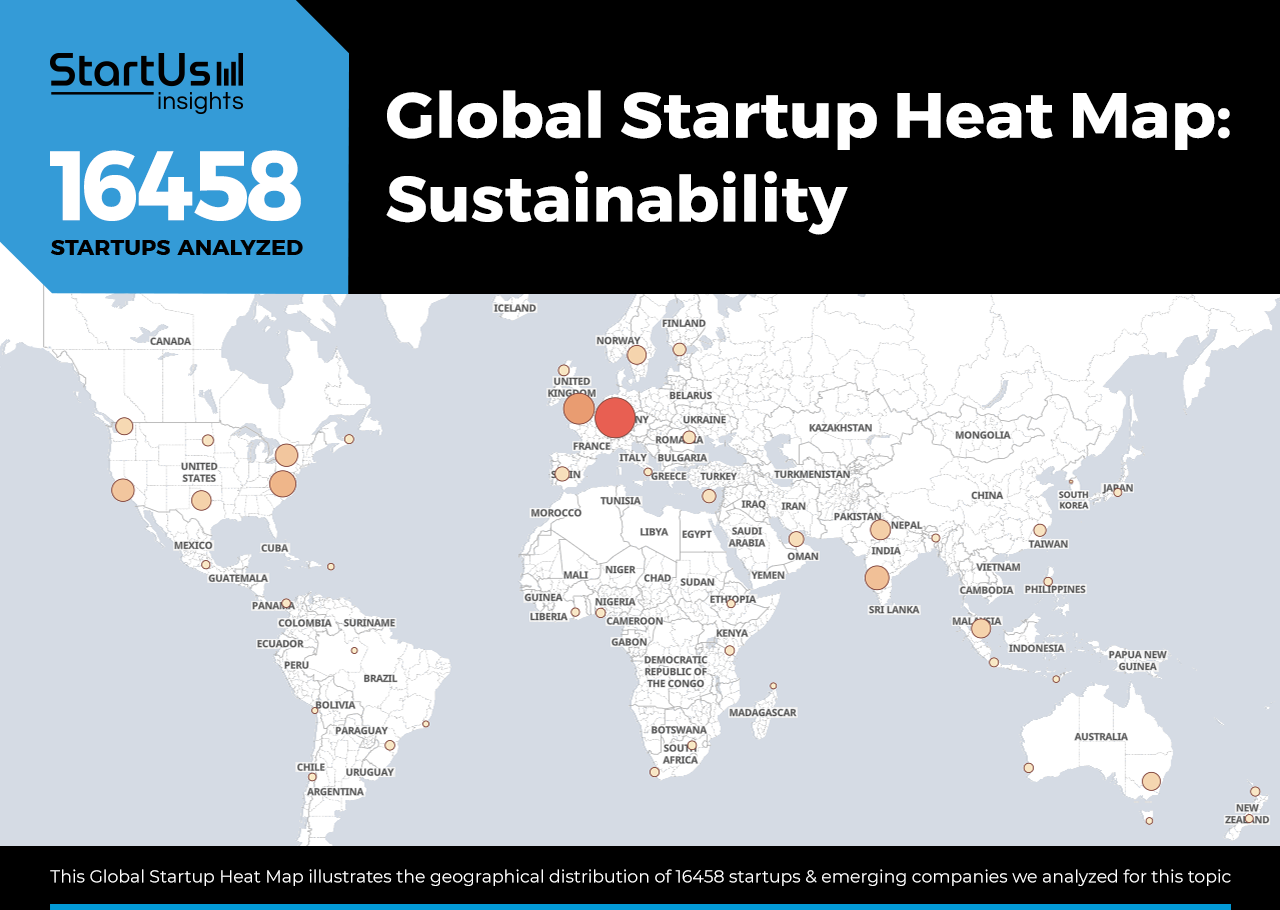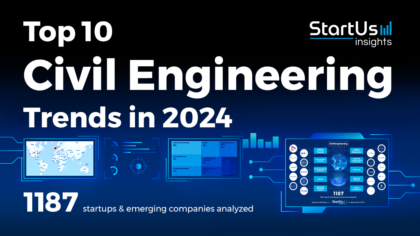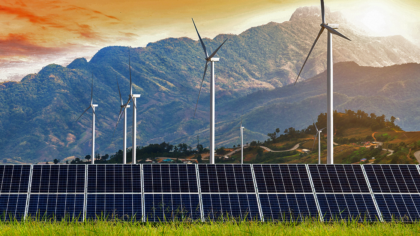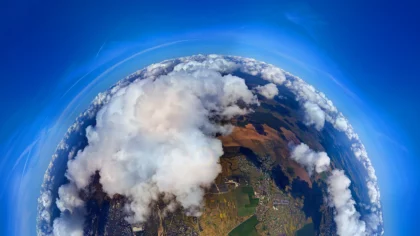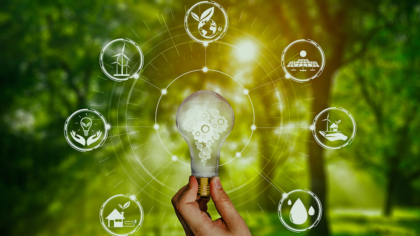There are a ton of ground-breaking sustainability trends in the circular bioeconomy and renewable energy sectors that directly address sustainability issues. While waste-to-resource and insect biotechnology in the bioeconomy are establishing sustainable value chains, perovskite solar cells, floating wind turbines, and solid-state batteries are transforming energy efficiency, storage, and production.
AI-powered solar tracking systems and cutting-edge biotechnologies are being developed by startups like Nimble Energy and BugEra, which are pushing the boundaries of decarbonization and the circular economy. Examine the innovative ways that these and other startups are redefining sustainability in a variety of industries. For a more thorough look at their offerings, continue reading.
What are the Top Sustainability Trends in 2025?
- Renewable Energy
- Circular Bioeconomy
- Carbon Neutrality
- Solid Waste Management
- Energy Storage Systems
- Biodiversity Conservation
- Climate Smart Agriculture
- Water Conservation
- Green Finance
- Electric Mobility
Methodology: How We Created the Sustainability Trend Report
For our trend reports, we leverage our proprietary StartUs Insights Discovery Platform, covering 5M+ global startups, 20K technologies & trends plus 150M+ patents, news articles, and market reports.
Creating a report involves approximately 40 hours of analysis. We evaluate our own startup data and complement these insights with external research, including industry reports, news articles, and market analyses. This process enables us to identify the most impactful and innovative trends in the sustainability industry.
For each trend, we select two exemplary startups that meet the following criteria:
- Relevance: Their product, technology, or solution aligns with the trend.
- Founding Year: Established between 2020 and 2025.
- Company Size: A maximum of 200 employees.
- Location: Specific geographic considerations.
This approach ensures our reports provide reliable, actionable insights into the sustainability innovation ecosystem while highlighting startups driving technological advancements in the industry.
Innovation Map outlines the Top Sustainability Trends & 10 Promising Startups
For this in-depth research on the Top Sustainability Trends & Startups, we analyzed a sample of 16 400+ global startups & scaleups. The Sustainability Innovation Map created from this data-driven research helps you improve strategic decision-making by giving you a comprehensive overview of the sustainability industry trends & startups that impact your company.
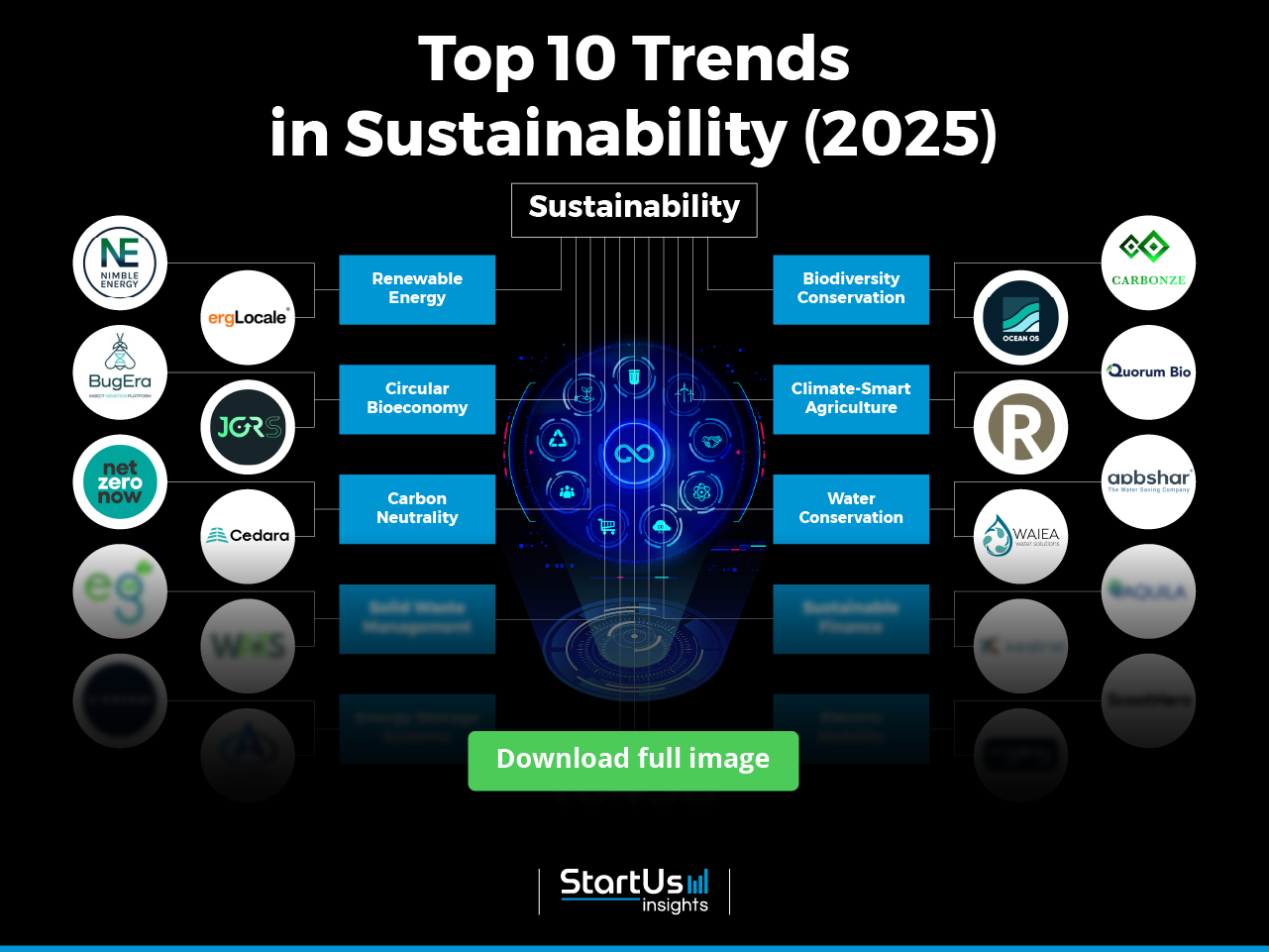
Tree Map Reveals the Impact of the Top 10 Trends in Sustainability Research (2025)
Based on the Sustainability Industry Innovation Map, the Tree Map below illustrates the impact of the Top Sustainability Industry in 2025. Renewable energy, circular bioeconomy, and green finance occupy a prominent position in the industry. Today the shift to carbon neutrality efforts, like direct air capture (DAC) and carbon capture, utilization, and storage (CCUS), play a vital role in reducing greenhouse gas emissions
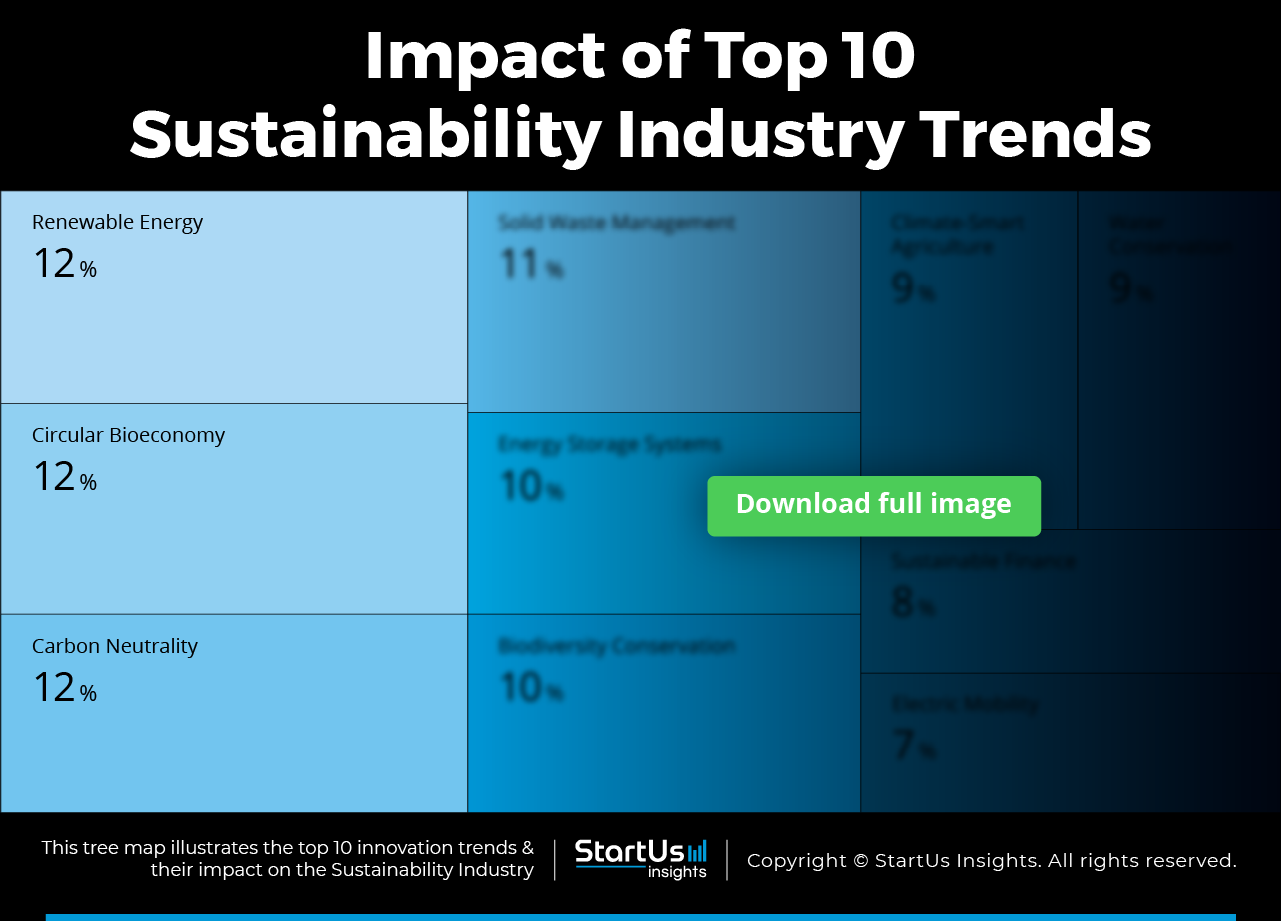
Global Startup Heat Map covers 16458 Sustainability Startups & Scaleups
The Global Startup Heat Map showcases the distribution of 16 400+ exemplary startups and scaleups analyzed using the StartUs Insights Discovery Platform. It highlights high startup activity in the US and Europe, followed by India and Malaysia. From these, 20 promising startups are featured below, selected based on factors like founding year, location, and funding.
Want to Explore Sustainability Innovations & Trends?
Top 10 Emerging Sustainability Trends (2025)
1. Renewable Energy
Perovskite solar cells, offshore wind platforms, and solid-state batteries are some of the instances of renewable energy technologies that meet pressing concerns like carbon emissions, storage constraints, and climate change.
Due to their increased efficiency and reduced manufacturing costs, perovskite solar cells (PSCs) provide significant advantages over conventional silicon-based photovoltaics. Simple, low-energy manufacturing methods like spray deposition are used to create them for quick and scalable production.
Another latest breakthrough in renewable energy is offshore floating wind turbines. It’s vast expanses of water to house solar panels while lowering water evaporation and resolving land-use issues. The solar panels are also cooled by these systems. Installations on reservoirs are one example of how land efficiency has been successfully increased.
By offering safer, more durable energy storage solutions that complement renewable energy systems — particularly in grid storage and electric vehicles, solid-state batteries advance sustainability. The environmental hazards connected with traditional lithium-ion batteries are lessened by their increased energy density and non-flammable composition.
The use of solar photovoltaic and wind energy comprised almost 90% of all newly built renewable energy infrastructure for the first nine months of 2024, which is 57% higher than the amount in 2023.
Nimble Energy develops an AI-powered Solar Tracking System
US-based startup Nimble Energy offers an AI-powered solar tracking system. The system maximizes solar energy efficiency by aligning solar panels with the sun’s movements throughout the day. The system uses machine learning models to continuously analyze real-time data. It allows for proactive energy management and accurate modifications.
Through the identification of both immediate and long-term savings opportunities, this technology enables customers to maximize energy production. It also allows them to take part in flexible-load programs, and lower utility bills.
The platform also incorporates capabilities for sustainability, decarbonization, and better indoor air quality, enabling building managers to manage energy use strategically. The core proposition of Nimble Energy is to facilitate the energy transition while empowering companies to run more efficiently.
ergLocale offers a Solar & Storage Planning Platform
Indian startup ergLocale offers a solar and storage planning platform ergCompare, designed for fleet owners and renewable energy developers. The platform uses real-time market data and sophisticated operational analytics to provide thorough side-by-side scenario comparisons.
It uses GIS-based site intelligence and high-frequency solar data to optimize the layouts of solar PV and battery energy storage systems (BESS).
Some of the important features include accurate revenue estimates, thorough financial modeling, and ideal equipment sizing. ergCompare speeds up decision-making and optimizes returns on investments in renewable energy by simulating various configuration mixes and integrating long-term energy profiles.
2. Circular Bioeconomy
Innovations in the circular bioeconomy produce regenerative cycles for material reuse, repair, and recycling, which lowers overall waste. Waste-to-resource technologies, like gasification and anaerobic digestion, for example, reduce landfill usage and provide sustainable energy alternatives by turning trash into useful energy.
With use in sectors like healthcare and construction, bio-based materials, such as bioplastics and compostable packaging made from agricultural waste, reduces pollution and reliance on non-renewable resources.
Sustainable biofuels, which are made from food and agricultural waste, are an additional substitute for fossil fuels and lower emissions from transportation. Regenerative techniques are used in circular agriculture to enhance soil health and sequester carbon.
Companies like Treetop Biopak, which creates compostable packaging from renewable resources, and Circular Food, which upcycles distillation waste, are two examples. In order to solve the ecological issues of our day, these solutions promote resource circularity, reduce emissions, and strengthen supply chain resilience.
The Indian bioeconomy market is set to reach USD 300 billion by 2030, up from USD 137 billion in 2023.
BugEra builds a Molecular Black Soldier Fly Platform
Israeli startup BugEra develops innovative Black Soldier Fly (BSF) biotechnologies, focusing on its product, BSFx2, a genetically enhanced BSF strain for biofuel production. Using its Molecular BSF Platform (M-BSF), the company enhances the natural traits of BSF to optimize oil yield, making it commercially viable for biodiesel, renewable diesel, and sustainable aviation fuel.
BugEra also offers Strain as a Service (StaaS), enabling customers to develop tailor-made BSF strains for specific needs. The company’s solutions drive the biofuel industry forward while advancing circular economy principles and reducing greenhouse gas emissions.
JORS Creating Circular Loops in Existing Agriculture
JORS, a Dutch startup, develops sustainable solutions by capturing the energy from insects to create circular loops in agriculture. Their approach transforms low-grade food waste into valuable proteins and fats and offers an eco-friendly alternative to traditional protein sources.
By promoting locally produced, vertically farmed insect protein, JORS reduces ecological footprints and supports sustainable agriculture. Additionally, the company partners with the food industry conducts research, and fosters education to accelerate the adoption of insect-based proteins.
3. Carbon Neutrality
Innovations such as carbon capture, utilization, and storage (CCUS), floating offshore wind power, green hydrogen, Direct Air Capture (DAC), and long-duration energy storage (LDES), advance the trend toward carbon neutrality.
DAC addresses emissions from difficult-to-abate industries by directly removing CO2 from the atmosphere using sophisticated sorbent materials. In the same way, green hydrogen, which is created by electrolysis driven by renewable resources, takes the place of fossil fuels in sectors like aviation.
While CCUS absorbs industrial pollutants and allows for negative emissions when paired with bioenergy, LDES ensures grid resilience by storing renewable energy for extended periods.
By using AI for carbon tracking, carbon neutrality solves the problems of supply chain vulnerabilities, operational inefficiencies, and accountability while also addressing regulatory requirements and Scope 3 emissions.
62% of Nifty50 companies in India have set carbon neutrality or net-zero targets, with a median target year of 2040.
Net Zero Now advances Carbon Reporting & Climate Action
UK-based startup Net Zero Now offers a carbon accounting and climate action platform for businesses to measure, reduce, and report their greenhouse gas emissions.
The platform operates using industry-endorsed sector-specific protocols, ensuring accurate measurement of Scope 1, 2, and 3 emissions in compliance with global sustainability standards. It provides users with tailored emissions reduction plans, targeting areas like energy efficiency and supply chain impact.
Some of the features include intuitive data entry, real-time carbon tracking, and integration with existing business tools like Xero and QuickBooks help manage and measure the source and scale of carbon emissions.
Cedara offers a Carbon Intelligence Platform
Cedara, a US-based startup, delivers a Carbon Intelligence Platform that quantifies and reduces carbon emissions for businesses. The platform offers guidance toward net-zero targets through a suite of data-driven tools. Assessing corporate carbon outputs across all activities, including supply chain and media emissions, allows companies to implement decarbonization strategies.
Cedara’s solutions utilize industry-aligned frameworks and offer actionable insights that reveal environmental impacts and facilitate vendor engagement for collective emissions reduction. Through technologies like the Hive Tracker, Cedara helps businesses meet sustainability goals and progress toward a greener future.
4. Solid Waste Management
Solid waste management is gaining traction due to the need to manage increasing amounts of trash, reduce environmental impact, and accelerate resource recovery while supporting global sustainability goals.
By precisely recognizing and separating recyclable items, AI-driven recycling robots improve sorting efficiency, lessen the strain on human labor, and keep waste out of landfills. Installed in densely populated towns, pneumatic waste pipes carry waste straight to processing facilities, reducing emissions and overflow.
Trash compactors that run on solar power expand bin capacity, reducing the number of collection trips and transportation-related emissions. E-waste kiosks also encourage the proper disposal of gadgets, avoiding the release of hazardous materials into the environment. These techniques have been effectively incorporated by cities like Songdo and Amsterdam, greatly enhancing their waste management infrastructure.
The solid waste management market size is set to reach USD 441.98 billion by 2034, growing at a compound annual growth rate (CAGR) of 4.2%.
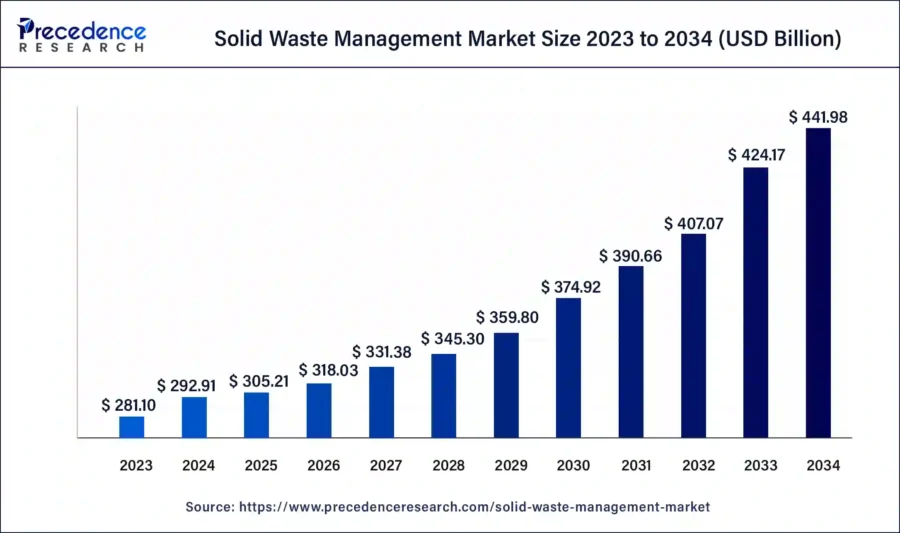
Credit: Precedence Research
WATS offers a Waste Administration & Tracking Software
Indian startup WATS (Waste Administration and Tracking Software) builds a platform that simplifies waste management for businesses by consolidating all waste-related data into one centralized dashboard. By automating data collection and processing, the program facilitates real-time reporting across many waste streams and streamlines operations.
WATS assists companies in tracking their progress toward sustainability objectives, identifying cost-saving opportunities, and optimizing waste reduction initiatives. Waste data aggregation, automated insights, and shareable metrics are important aspects for businesses to improve operational efficiency and advance sustainability programs.
Envigrow Sustainable Solutions enables Sustainable Solid Waste Management
US-based startup Envigrow Sustainable Solutions implements an efficient waste management process that begins with waste collection from communities and segregating organic and inorganic waste at the source. Through aerobic composting, organic waste is converted into compost that can be used in agriculture.
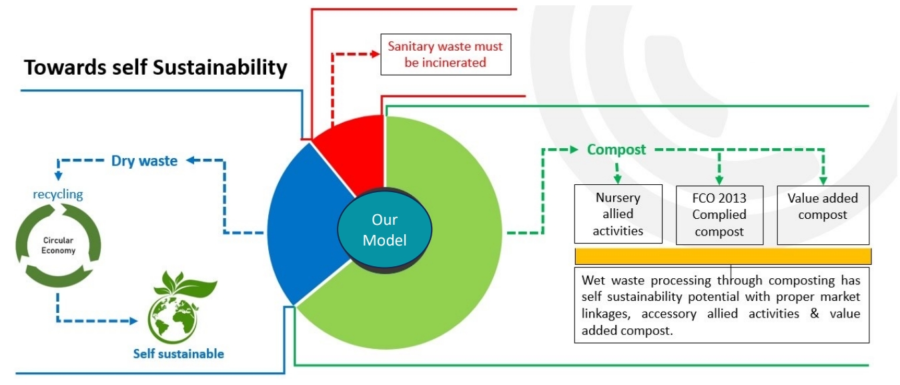
After additional sorting, recyclables are processed and non-recyclables are disposed of properly. The business incorporates such methods to produce biofuel from biodegradable garbage and supports the ideas of the circular economy. Envigrow also lessens the usage of landfills with their process.
5. Energy Storage Systems
The stability and dependability of renewable energy sources are improved by energy storage devices. Solid-state batteries, among other breakthroughs, are transforming grid and electric car applications by providing faster charging and higher energy densities.
Hybrid Energy Storage Systems (HESS) are perfect for microgrids because they optimize performance in both short-term power fluctuations and long-term storage by combining batteries and supercapacitors.
Energy storage for more than ten hours is made possible by Long-Duration Energy Storage (LDES) systems, such as those made by Form Energy, which act as a backup during intermittent renewable energy sources. AI-enabled smart solutions, such as Tesla’s Powerwall, also optimize grid interactions and energy use.
Businesses like BYD and NineDot Energy are setting the standard by implementing these technologies globally.
The global energy storage installations are set to grow by 76% in 2025. Additionally, the global energy storage systems market is set to reach USD 569.39 billion by 2034, growing at a CAGR of 7.87% from 2025 to 2034.
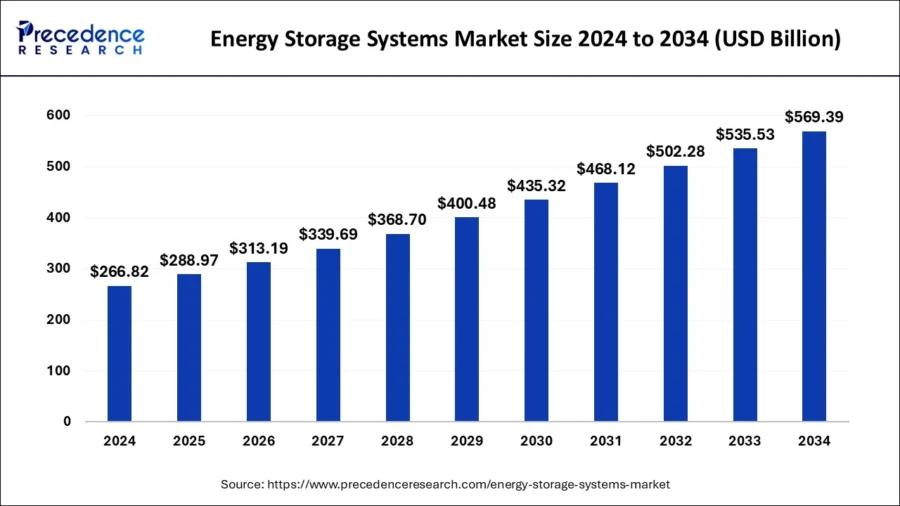
Credit: Precedence Research
Li Energy enables Advanced Lithium Battery Energy Storage
Indian startup Li Energy offers advanced lithium battery energy storage solutions, including the container BESS. The solutions optimize safety, and energy efficiency, and enable ease of integration across power sources, grids, loads, and storage systems. Its thin-cell technology manages heat and offers a cycle life of approximately 10,000 cycles.
Moreover, its high-capacity prismatic cells are certified by GB, UL, and CB. Li Energy offers easy installation and maintenance by the plug-and-play &modular design. With capacities ranging from approximately 1 kWh to 2000 MWh, they facilitate a smooth transition to sustainable energy.
The company also supports uses like power transmission, industrial power backup, and renewable energy.
North Harbour Clean Energy produces On-demand Clean Electricity
Australian startup North Harbour Clean Energy develops utility-scale energy storage solutions, including pumped hydro, lithium-ion, and vanadium flow batteries, to deliver on-demand, clean electricity. These devices harvest renewable energy from solar and wind power and store it for use during peak demand.
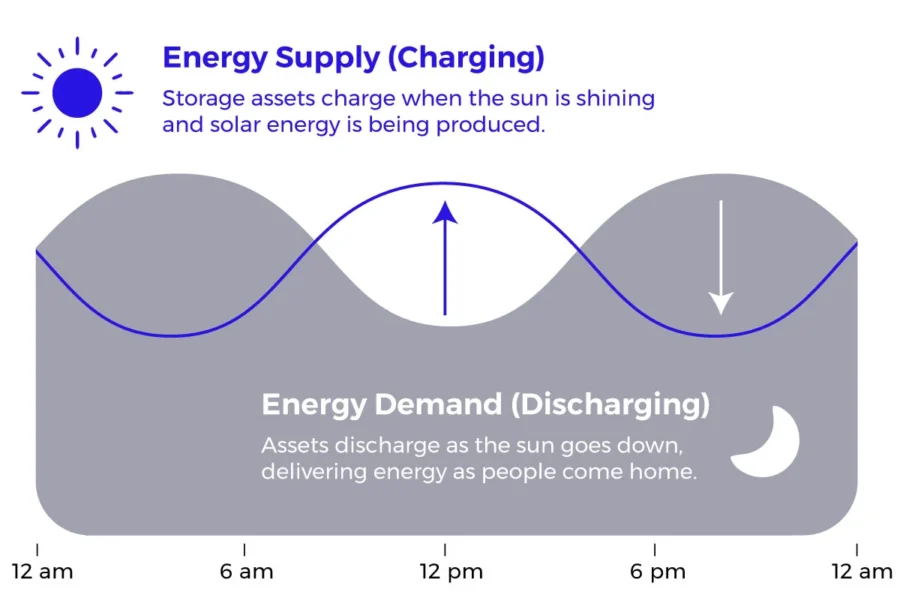
Advanced management software and its assets facilitate charging, discharging, and grid integration. North Harbour Clean Energy enables dependable power delivery with an emphasis on decarbonizing electrical systems.

6. Biodiversity Conservation
Technologies for biodiversity conservation Environmental DNA (eDNA) uses DNA fragments found in soil or water to track species and ecosystem health non-invasively for more accurate conservation.
Similarly, real-time species data is provided by AI-powered systems such as Nucleic Sensing Systems, which support proactive ecosystem management. Using methods like precision farming and agroforestry to improve soil health and boost biodiversity, regenerative agriculture is also becoming more popular.
Drones and GIS technologies also help track habitat restoration and reforestation initiatives. Together, these developments aid in the restoration of ecosystems and assist companies in achieving sustainability goals while protecting natural resources.
For example, Dow has improved biodiversity outcomes and reduced costs at its operational sites by combining AI techniques with nature-based solutions. These advancements demonstrate how technology and conservation are increasingly working together to benefit companies and ecosystems.
The environment, conservation, and wildlife organization market size has grown from USD 28.99 billion in 2024 to USD 31.4 billion in 2025 at a CAGR of 8.3%. Furthermore, the National Environmental Education Foundation (NEEF) offered USD 200 000 in grant funding for pollinator habitat enhancement projects on at least 500 acres of public land.

Credit: The Business Research Company
CarbonZE develops a Carbon Management Platform
German startup CarbonZE offers a carbon management platform that measures and analyzes the carbon footprint of organizations. The platform also manages broader environmental impacts such as biodiversity, water, and land use.
CarbonZE provides resources for establishing and tracking reduction projects to achieve science-based sustainability goals and connects them with a network of sustainability partners. It offers environmental insights and reports for companies to achieve their sustainability objectives and legal obligations.
Ocean OS facilitates Environment Monitoring
UK-based Ocean OS provides biodiversity data through advanced environmental monitoring systems, combining in-situ sensors, machine learning, and satellite imagery to capture real-time site-level data.
It provides resources for monitoring changes, assessing the health of ecosystems, and forecasting trends in biodiversity in the future. The platform assists in decision-making at every stage of development for a variety of environmental projects. Ocean OS’s assessment ecosystem combines remote sensing and ground-based data, that manages biodiversity.
7. Climate Smart Agriculture
Globally, climate-smart agriculture promotes sustainable farming methods, minimizes its negative effects on the environment, and increases food security. With the help of sensors, artificial intelligence, and drones, digital agriculture monitors crops and soil in real time. These technologies enhance productivity and resource management while reducing its negative effects on the environment.
Regenerative agriculture improves water retention, boosts biodiversity and carbon sequestration, and restores soil health through techniques like cover cropping, crop rotation, and reduced tillage. AI platforms are used in precision farming to maximize resource use, reduce expenses, and increase yields.
Water scarcity in agriculture is addressed by solar-powered irrigation systems, like Spowdi’s – a green tech company, which lower carbon emissions and water consumption. Furthermore, biological crop treatments improve soil and crop resilience without the use of artificial inputs by utilizing natural microorganisms.
The Australian government has established a USD 302.1 million climate-smart agriculture program over five years from 2023-2034.
Quorum Bio enables Regenerative & Climate-Resilient Farming
US-based startup Quorum Bio specializes in engineering crop microbiomes to optimize nutrient acquisition, enhance resilience to environmental stress, and promote carbon sequestration across all agricultural environments. The company has created precision biologics to produce reliable and climate-resilient outcomes by utilizing microbial synthetic biology.
By increasing nutrient uptake, these engineered microbes lessen the need for chemical fertilizers, increase crop resistance to environmental stressors like disease and drought, and support extensive soil carbon sequestration initiatives.
Open Regen develops a Viticulture-specialist Chat GPT Plugin
US-based startup Open Regen provides viticulture specialists with an AI-driven decision-support platform. It empowers farmers to make data-driven choices to improve both profitability and sustainability. Utilizing artificial intelligence and data sources, the company provides a customized Chat GPT tool to assist farmers in brainstorming and resolving viticulture-specific issues.
This platform integrates a Yelp-style database of products and farming methods and allows users to upload documents for rapid data analysis and synthesis. The platform supports the shift to climate-smart and regenerative farming, Open Regen offers access to peer-reviewed research and farmer recommendations. This optimizes their operations and reduces the risk of adopting new practices.
8. Water Conservation
Businesses are increasingly focused on reducing water waste as part of their sustainability strategies. They also implement circular water systems to recycle and reuse water resources.
As water use regulations become stricter and water prices rise, AI-driven predictive analytics is leveraged to optimize distribution and leak detection. Additionally, by adapting to current weather and soil conditions to determine the best irrigation levels, IoT-enabled smart irrigation systems are increasing the efficiency of water use in agriculture.
New desalination technologies, such as those developed by Algaesys, are advancing the transformation of saltwater into freshwater. It employs algae-based techniques to remove impurities that make the process more economical and sustainable.
Additionally, greywater recycling systems repurpose domestic wastewater for irrigation to reduce reliance on fresh water. Cities like Barcelona and Singapore have implemented smart water grids and irrigation systems that help lower water usage.
In 2024, total groundwater recharge witnessed a significant increase of 15 billion cubic meters while the extraction decreased by 3 billion cubic meters in India. However, water conservation efforts require more attention as it is estimated that around 700 million people could be displaced due to extreme water scarcity by 2030.
Aabshar makes Resource-saving Water Nozzle
Pakistani startup Aabshar offers innovative water-saving technology that addresses global water scarcity. The company’s product, a specially designed nozzle, maintains current water pressure while reducing water consumption.
Made of sturdy, food-grade brass, this nozzle requires no additional plumbing with quick installation. Because less water means less reliance on electric water pumps, the nozzle not only conserves water but also saves electricity.
WAIEA Water enables Air to Water Generation
US-based startup WAIEA Water manufactures air-to-water generators (AWG) that convert atmospheric humidity into clean, safe drinking water using advanced filtration systems like charcoal, UV and reverse osmosis. These AWGs are suited for residential, workplaces, and off-grid areas as they operate independently of traditional water or plumbing connections.
These systems produce high-quality, alkaline water with a pH between 7.0 and 9.2, enriched with essential minerals like calcium and magnesium. Additionally, WAIEA Water offers greywater recycling systems, empowering users to repurpose water and reduce overall usage.
WAIEA Water’s products also mitigate carbon emissions and reduce plastic through eco-friendly living solutions for individuals and communities globally.
9. Green Finance
Sustainable finance tools, such as sustainability-linked bonds (SLBs) and loans (SLLs), connect debt issuance to specific sustainability performance targets. By linking financing to Environmental, Social, and Governance (ESG) objectives, these tools have become essential in encouraging businesses to prioritize and achieve their sustainability goals.
Another significant trend is the use of green bonds by businesses and governments to finance low-carbon projects, such as renewable energy, and to accelerate the energy transition.
The incorporation of carbon trading mechanisms, in which companies purchase and sell carbon credits to offset their emissions, is another innovation. This has worked especially well in industries like heavy industry and energy.
The rise of impact investing has shifted investor focus toward projects with measurable social and environmental benefits. As a result, capital flows are increasingly directed toward renewable energy, reflecting this priority on positive, quantifiable outcomes.
All things considered, sustainable finance gives companies the resources they need to promote both significant environmental impact and financial growth.
The sustainable finance market is set to grow from USD 6718 billion in 2024 to USD 8272 billion in 2025 growing at a CAGR of 23.1%.

Credit: The Business Research Company
AQUILA.is streamlines IoT powered Sustainable Finance
AQUILA.is, a UAE-based startup, develops an IoT-powered platform that transforms the way financial institutions engage with sustainable finance by providing accurate, real-time ESG data. Key environmental indicators like carbon emissions and water quality can be precisely tracked thanks to the platform, which gathers data from a huge network of IoT devices, sensors, and satellites.
AQUILA.is simplifies financial institutions’ decision-making processes by automating the gathering and reporting of sustainability metrics, which lowers costs and improves transparency. By providing auditable data, the platform adheres to compliance and gives institutions the confidence to issue, manage, and report on sustainable finance products.
Kestrel advances Sustainability Intelligence for Municipal Finance
US-based startup Kestrel offers a sustainability intelligence platform that supports market participants in the municipal finance sector by providing actionable insights on environmental and social risk.
The platform combines social and environmental sciences to assess bond-financed activities through a science-based methodology and for reliable evaluations.With Kestrel’s Analysis and Scores system, market participants evaluate the sustainability and risk profiles of investments at the bond level. This system offers transparent and dependable ESG data for informed decision-making.
10. Electric Mobility
Electric mobility reduces greenhouse gas emissions by making a direct impact on air pollution and climate change. Advancements in battery technology, such as the use of lithium iron phosphate (LFP) batteries support sustainability by improving battery safety and longevity.
Tesla, for example, exemplifies this progress through dual battery products that increase energy density and lifespan. Additionally, vehicle-to-everything (V2X) solutions allow electric vehicles (EVs) to feed power back into the grid, which strengthens energy networks and enhances resilience.
In pursuit of grid stability, companies like Youree and Sun2wheel are developing innovative solutions that enable EVs to supply energy to homes and buildings that provide a critical backup power source.
Autonomous driving technology is also advancing alongside electric mobility, as demonstrated by Tesla’s investments in self-driving EVs. Together, these innovations are easing urban congestion, and delivering long-term benefits, including cost savings, energy efficiency, and improved air quality.
Electric mobility contributes significantly towards sustainable growth as in a year, a single electric car saves an average of 1.5 million grams of carbon dioxide.
ScootHero builds an Electric-Mobility Solution for Fleet Managers
South African startup ScootHero offers an electric mobility solution for fleet managers and last-mile delivery drivers to support environmentally friendly transportation. It provides a platform that combines maintenance, on-road services, carbon credit audits, and the procurement of electric vehicles.
ScootHero’s approximate 400 battery swap locations enable quick battery changes that reduce downtime and improve fleet efficiency. Fleet managers maximize vehicle performance while cutting expenses by using the platform’s tools for managing driver analytics, scheduling maintenance, and managing compliance.
REGENY designs a Charge Point Management Platform
UAE-based startup REGENY provides advanced electric vehicle (EV) charging solutions. It integrates a range of AC and DC fast chargers with a smart charge point management platform. The company’s mobile app connects EV users to monitor charging sessions with effective power distribution.
With features like real-time tracking, remote diagnostics, and optimized charging schedules, the platform is used for both home and business applications. REGENY facilitates the shift to sustainable electric mobility by uniting EV users and stakeholders into a single community.
Discover all Sustainability Trends, Technologies & Startups
The sustainability sector is at a turning point in its history, with both tremendous obstacles and remarkable chances for advancement. The industry is changing as a result of solutions that tackle urgent environmental problems, such as carbon neutrality technologies, circular bioeconomy plans, and innovations in renewable energy.
Overcoming obstacles like resource scarcity, regulatory uncertainty, and energy storage limitations requires these innovations. A sustainable future for businesses and society will depend on ongoing technological and policy developments as sustainability becomes a global imperative.
The Sustainability Trends & Startups outlined in this report only scratch the surface of trends that we identified during our data-driven innovation & startup scouting process. Identifying new opportunities & emerging technologies to implement into your business goes a long way in gaining a competitive advantage.


